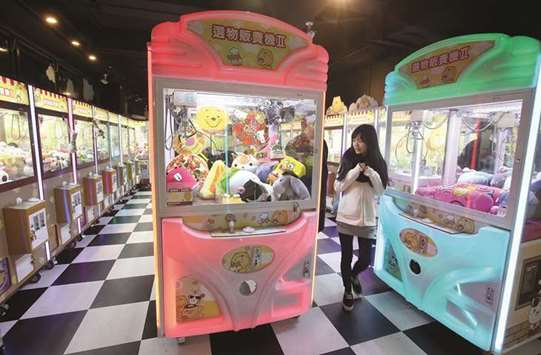For 16-year-old Kuan-ting Lin, teaming up with his father to beat a claw crane game seemed like a winning idea.
During a trip to Japan a few months ago, he played the arcade game for the first time and was immediately hooked.
So, on a recent evening, on their way to dinner in Taipei, the pair tested their luck and skills on a claw crane, hoping to snare an expensive model of a Japanese manga character in a glass-encased box.
“I definitely want to win the prize,” shouted the boy as he operated the three-pronged claw several times, failing to get the target out.
With a handful of coins, the boy’s father then tried his luck.
After spending 200 New Taiwan dollars (7 US dollars), they gave up hope of beating the machine, whose loose claw seemed to them like it was likely designed to give a jiggle after it grasped an object.
“Anyway, we had a good time. Trading a little money for a chance to win something helps relieve stress,” said Vincent Lin, the father.
Several new claw crane shops opened recently in his neighbourhood, while others are under renovation, reflecting a growing trend in Taiwan, where, according to official figures, the number of such shops has doubled since 2017 – and they show no sign of slowing down.
According to the Finance Ministry, the number of claw machine shops in Taiwan had increased to 2,449 in November 2017, from 889 in November 2016. In October alone, more than 400 new shops opened.
“Players all feel a sense of achievement when they win something. Even though the prizes, such as stuffed dolls, are cheap,” Lin said.
Some of the new shops feature specific themes, while others have cosy spaces for customers to take selfies with cute animal characters.
“You get only virtual rewards from online games. I prefer getting something real,” said Ting-chen Chang, a 19-year-old university student who has been playing claw crane games for five years.
Chang enjoys visiting claw crane shops and looking for special stuffed toys. She still remembers her happiness as a child holding rarely seen stuffed toys that her uncles had won on claw cranes.
“That’s a little happiness in hand,” she explained.
Chang even sometimes plays claw machines through mobile phone apps.
“On the screen, you see a real machine and can play it through your phone. The prize will be sent to your home if you win,” she said.
Most claw crane shops on the island are run by small- and mid-sized companies that buy or rent the machines from suppliers to sublet. Renting a claw crane in Taipei costs at least 5,000 New Taiwan dollars, though the rate varies depending on location: At some night markets popular with tourists, it can be 10,000 New Taiwan dollars.
Low, stagnating wages in Taiwan have prompted some young people to seek their fortunes by investing in claw crane games, rather than put money in the bank, because the machines generate a steady cash flow.
Tony Chou, 35, who rents a claw crane for extra income, said his monthly net earnings from the machine are about 5,000 New Taiwan dollars.
“It’s quite a deal. I just spend some time after work buying cute stuffed toys online and putting them in the machine,” said Chou, joking that it’s faster than waiting to get a raise at work.
Chu-hsuan Hu, a 26-year-old office employee, recently spent 30,000 New Taiwan dollars buying a machine after previously renting one.
“I was addicted to claw crane games and have gained knowledge about how to run the business. I’m confident that the stuff I choose for my machine will attract target female customers,” she said.
To ensure diversity, she purchases special accessories and cute stuffed toys from different sources.
Recently in Taiwan, more types of goods are placed inside claw crane games to target different customers. Items include cheap electronic gadgets, toilet papers, instant noodles, towels, wallets and more.
In southern Taiwan, one game centre even recently hired bikini-clad women to sit with stuffed toys inside the machines to lure players. – DPA

SOARING: A woman inspects claw crane machines at a shop. The number of shops in Taiwan that feature claw crane machines has doubled in the past year.
